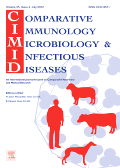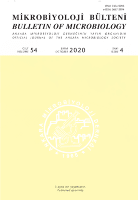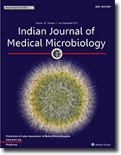
MICROBIOLOGY AND IMMUNOLOGY
Scope & Guideline
Exploring the Frontiers of Microbial and Immune Science
Introduction
Aims and Scopes
- Infectious Disease Epidemiology:
The journal publishes studies investigating the epidemiology of infectious diseases, including the prevalence, transmission dynamics, and risk factors associated with various pathogens. - Antimicrobial Resistance:
A significant focus is on the mechanisms and patterns of antimicrobial resistance among bacterial pathogens, with research aimed at understanding resistance genes and their clinical implications. - Host-Pathogen Interactions:
Research on the interactions between pathogens and the host immune system is prevalent, exploring how pathogens evade immune responses and the immune mechanisms that combat infections. - Clinical Microbiology and Diagnostics:
The journal emphasizes advancements in clinical microbiology, particularly in the development and validation of diagnostic methods for infectious diseases. - Vaccine Development and Immunization Strategies:
Studies on the efficacy of vaccines, immune responses to vaccination, and the development of novel vaccine candidates against emerging infectious diseases are regularly featured. - Public Health Implications:
Research that addresses the public health implications of infectious diseases, including outbreak investigations and health policy recommendations, is a core area of interest. - Novel Therapeutics and Treatment Strategies:
The journal discusses novel therapeutic approaches for managing infectious diseases, including the use of new antimicrobial agents and adjunct therapies.
Trending and Emerging
- COVID-19 and Related Research:
There is a marked increase in research related to COVID-19, including studies on viral pathogenesis, immune responses, and the impact of the pandemic on healthcare systems. - Long COVID and Post-Acute Sequelae:
Emerging research on Long COVID and its sequelae is gaining attention, focusing on the long-term effects of SARS-CoV-2 infection on various organ systems. - Microbiome Studies and Their Clinical Implications:
Research exploring the human microbiome and its relation to health and disease, particularly in the context of infections and immune responses, is increasingly prevalent. - Antimicrobial Stewardship and Resistance Management:
There is a growing emphasis on antimicrobial stewardship programs and strategies to combat antimicrobial resistance, reflecting a public health priority. - Vaccine Efficacy and New Vaccine Platforms:
Research on the efficacy of existing vaccines and the development of new vaccine technologies, including mRNA and vector-based platforms, is on the rise. - Emerging Infectious Diseases and Zoonoses:
Studies focusing on emerging infectious diseases and zoonotic infections are trending, driven by global health concerns and the need for surveillance.
Declining or Waning
- Traditional Microbial Pathogen Identification:
Research focused solely on traditional culture-based methods for identifying microbial pathogens has decreased, as newer molecular techniques gain prevalence. - Single-Pathogen Studies:
There has been a shift away from studies focusing on single pathogens towards more complex investigations involving multiple pathogens and polymicrobial infections. - Basic Laboratory Techniques without Clinical Relevance:
Studies that present basic laboratory techniques without direct clinical application or relevance are becoming less common, as the journal seeks to emphasize translational research. - Animal Models for Infection Studies:
Research employing animal models for infection studies has seen a decline, with a growing preference for human-relevant models and clinical studies.
Similar Journals

COMPARATIVE IMMUNOLOGY MICROBIOLOGY AND INFECTIOUS DISEASES
Unraveling Complexities of Immune ResponsesComparative Immunology Microbiology and Infectious Diseases, published by Elsevier Science Ltd, is a prominent journal dedicated to advancing the fields of immunology, microbiology, infectious diseases, and veterinary sciences. Established in 1978, this journal has become a vital resource for researchers and professionals alike, with a commendable impact factor that reflects its significance in academia. The journal, available in both print and electronic formats (ISSN: 0147-9571, E-ISSN: 1878-1667), stands out for its commitment to disseminating innovative research findings, particularly through its categorization in Q2 and Q3 quartiles across various related disciplines as of 2023. The journal aims to provide insightful comparative analyses that enhance our understanding of host-pathogen interactions, immune responses, and disease manifestations. With a global readership base, it serves as a platform for collaborative discourse among scientists and professionals, ultimately contributing to the improvement of health outcomes worldwide.

MIKROBIYOLOJI BULTENI
Unveiling the Complexities of Microbial LifeMIKROBIYOLOJI BULTENI, with ISSN 0374-9096, is a prestigious academic journal published by the ANKARA MICROBIOLOGY SOC, located in Ankara, Turkey. Established in 1973, this journal has been a vital conduit for disseminating research in the fields of Immunology, Microbiology, and Infectious Diseases, garnering a reputation as a significant contributor to the scientific community. The journal is currently ranked in the Q3 category within Immunology and Microbiology (miscellaneous), and Infectious Diseases, indicating its impactful presence amidst contemporary research. With access options that may be restricted, MIKROBIYOLOJI BULTENI actively welcomes submissions that advance the understanding of critical microbiological principles and practices, thereby supporting both national and international research efforts. Researchers, professionals, and students are encouraged to explore the latest findings shared in this journal, as it continually shapes the landscape of microbiology and infectious disease studies through its comprehensive and rigorous peer-reviewed publications.

Nature Microbiology
Exploring Innovations in Applied MicrobiologyNature Microbiology is a premier journal published by NATURE PORTFOLIO that has firmly established itself within the realms of microbiological research since its inception in 2016. Based in the United Kingdom, this prestigious journal specializes in the intricacies of applied microbiology, cell biology, genetics, immunology, and medical microbiology, making it a cornerstone for academics and professionals alike. With an impressive Scopus ranking placing it in the top tier across various relevant categories—such as rank #3 in Genetics and #2 in Applied Microbiology—it underscores the journal’s commitment to high-quality, impactful research. Although it operates under a subscription model, Nature Microbiology's broad Open Access policy facilitates greater dissemination and visibility for its authors. The journal's objectives are centered around publishing cutting-edge advancements that enhance our understanding of microbial life, its interactions, and applications in health and disease. As a Q1 journal across multiple disciplines, it holds immense significance for researchers, professionals, and students enthusiastic about the latest innovations and breakthroughs in microbiology.

Infectious Diseases
Transforming Discoveries into Solutions for Global HealthInfectious Diseases, published by TAYLOR & FRANCIS LTD, is a leading academic journal dedicated to advancing research in the field of infectious diseases and microbiology. With an impressive impact factor and categorized in Q1 in multiple areas including Immunology and Microbiology, this journal serves as a critical platform for researchers, practitioners, and students to disseminate their findings and stay abreast of current advancements. The journal is recognized for its rigorous peer-review process and aims to foster innovation and collaboration across disciplines from 2015 to 2024. It boasts a robust Scopus ranking, positioning it favorably among the top-tier of journals in the relevant fields, making it an essential resource for anyone involved in infectious disease research. Access options are available, ensuring that the latest research is accessible to a global audience, thus emphasizing the journal's commitment to promoting knowledge and understanding in the ever-evolving landscape of infectious diseases.

INFECTION AND IMMUNITY
Unveiling Innovations in Microbiology and ImmunologyINFECTION AND IMMUNITY is a distinguished peer-reviewed journal published by the American Society for Microbiology, focusing on groundbreaking research in the fields of infection, immunology, microbiology, and parasitology. Established in 1971, this journal has built a robust legacy, converging years of scientific discovery with a vision towards 2024 and beyond. With an impressive Impact Factor, the journal holds significant rankings in various categories; its Q1 status in both Infectious Diseases and Parasitology underscores its high relevance and quality within the scientific community. Researchers and professionals alike will benefit from its content, as it promotes the latest advances in understanding immune responses and infectious agents, further legitimizing its place among the top quartiles of its respective fields. Access options are provided through traditional subscription models, ensuring a broad charitable dissemination of knowledge. As a pivotal resource for scholars and practitioners alike, INFECTION AND IMMUNITY stands at the forefront of microbiological and immunological research, fostering essential discourse that is crucial for advancing public health and scientific insight.

Indian Journal of Medical Microbiology
Connecting Global Scholars in Microbiology and Infectious DiseasesIndian Journal of Medical Microbiology, published by Elsevier, is a pivotal peer-reviewed journal dedicated to the field of medical microbiology, providing a vital platform for research and scholarship since its inception in 1986. With an Open Access model established in 2001, it ensures the dissemination of scientific knowledge to a global audience, enhancing accessibility for researchers, professionals, and students alike. The journal's scope spans critical areas including immunology, infectious diseases, and microbiology, with an impressive trajectory marked by converged years of publication allowing for a comprehensive exploration of evolving scientific trends. As of 2023, the journal holds a Q3 ranking in Infectious Diseases and Microbiology (medical) and a Q4 ranking in Immunology and Microbiology categories, reflecting its significant yet growing impact in the field. Researchers seeking to contribute to or stay updated on the latest advancements in medical microbiology will find the Indian Journal of Medical Microbiology a valuable resource, as it consistently bridges the gap between emerging science and clinical application.

Infectious Microbes & Diseases
Advancing the frontiers of infectious disease research.Infectious Microbes & Diseases, published by Lippincott Williams & Wilkins, is a premier journal dedicated to the exploration and understanding of infectious diseases, microbiology, and epidemiology. With its focused scope and robust peer-review process, the journal aims to disseminate high-quality research that contributes to advancements in the field, making it an essential resource for researchers, healthcare professionals, and students alike. Established in 2019, it has quickly gained recognition, achieving a Q3 rating in categories such as Epidemiology, Infectious Diseases, and Medical Microbiology in 2023, and ranking in the top half of its field within Scopus metrics. Although currently offered as a subscription-based journal, Infectious Microbes & Diseases significantly enriches its disciplines by inviting innovative research and critical review articles, thus playing a vital role in combating the global challenges posed by infectious diseases.

Virulence
Leading the Charge in Virulence ResearchVirulence, a leading academic journal published by Taylor & Francis Inc, is dedicated to advancing the understanding of virulence mechanisms in pathogens across various infectious diseases. Since becoming an Open Access publication in 2018, it has broadened the accessibility of cutting-edge research for a global audience, promoting collaboration and knowledge-sharing among researchers, professionals, and students alike. With a significant impact within its field, the journal boasts impressive 2023 quartile rankings: Q2 in Immunology and Q1 in both Infectious Diseases and Microbiology, alongside notable standings in Parasitology. The current Scopus rankings reinforce its prominence, with high percentiles indicating its influence and relevance in advancing scientific inquiry. Covering a period from 2010 to 2024, Virulence serves as an essential platform for innovative research that not only addresses the critical challenges in understanding pathogen behavior but also contributes towards global health solutions, establishing it as a vital resource in the rapidly evolving fields of immunology, microbiology, and parasitology.

EPIDEMIOLOGIE MIKROBIOLOGIE IMUNOLOGIE
Advancing Knowledge in Health SciencesEPIDEMIOLOGIE MIKROBIOLOGIE IMUNOLOGIE is a prominent scholarly journal published by CESKA LEKARSKA SPOLECNOST J EV PURKYNE in the Czech Republic. With an ISSN of 1210-7913, this journal has been at the forefront of research since its inception in 1994, showcasing a rich repository of studies bridging the domains of epidemiology, microbiology, immunology, and infectious diseases, and reflecting advancements over three decades. Although it currently falls within the Q4 category in multiple fields including Epidemiology and Microbiology, the journal serves an essential role in disseminating knowledge and fostering discussions around public health challenges. The contributions made through its pages are vital for researchers, healthcare professionals, and students aiming to enhance their understanding of complex biomedical issues. While it does not offer open access, the journal remains a critical resource in its niches, inviting readers to engage with the latest findings and methodologies reshaping the landscape of health science.

ANAEROBE
Pioneering Research in Infectious Diseases and MicrobiologyANAEROBE is a highly regarded scholarly journal published by Elsevier Science Ltd, dedicated to advancing the study of anaerobic microorganisms and their roles in infectious diseases, microbiology, and various clinical applications. With an ISSN of 1075-9964 and an E-ISSN of 1095-8274, this journal has established itself as a pivotal resource for researchers and professionals interested in the unique aspects of anaerobic biology since its inception in 1995. Ranking in the Q2 category in both Infectious Diseases and Microbiology, it stands out for its commitment to publishing high-quality research that reflects the evolving complexities of microbial interactions in health and disease. Although the journal currently does not offer Open Access options, its impact is notable, with the 2023 Scopus rankings reflecting a practice of excellence—ranked #137/344 in Infectious Diseases and #96/182 in Microbiology. As a vital forum for scholarly exchange, ANAEROBE serves as an essential platform for scientists seeking to explore the depths of anaerobic studies, shaping future discoveries and clinical advancements.